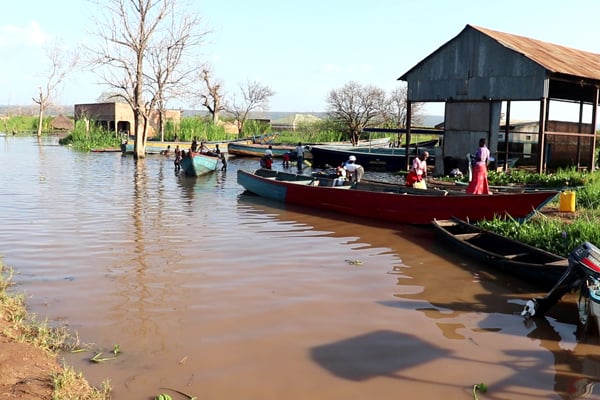Prime
Obongi locals yet to return home after 2019 flooding

Some of the flooded areas in Obongi Town Council, Obongi District. PHOTO/FELIX WAROM OKELLO
What you need to know:
- In 2019, River Nile burst its banks, leaving much of Obongi Town Council flooded.
Hundreds of families in Obongi District, West Nile, are still displaced two years after flooding caused by rising River Nile waters hit the sub-region.
In 2019, heavy flooding from River Nile left Obongi Landing Site and the neighbouring Obongi Town Council submerged.
But since then, many homes, shops, primary schools and the main mosque in Obongi Town Council have remained submerged.
Most of the mud-wattle houses have collapsed while the once booming business at Obongi Landing Site is no more.
Previously, the landing site was a beehive of activity, with many kiosks set up to target passengers to and fro Adjumani District. But this is no more since the area is flooded.
The floods have also inundated many degraded wetlands in the area.
Speaking to Daily Monitor last Thursday, Mr Kassim Ramadhan, a resident at the landing site, said: “The floods have left us hopeless because we can no longer make profits. We do not know how we are going to send back our children to school because fish sale was our main economic activity.”
He said there are no signs that the floods will subside.
Ms Christine Moriku, who used to operate a hotel at the landing site, said: “My dilemma is the loan that I had taken to boost my business. When floods chased us from the landing site, business became low and I am now stuck. I used to rely on customers crossing using the ferry but they are no more. It is a big loss in my life.”
Ms Zaitun Ajiko, 42, who has lived near the landing site for more than 30 years, said she had to flee after floods submerged her house in Namsambia Village, Obongi Town Council.
“I have been taking refuge at my relative’s home since last year when the floods reached our home. All the gardens are flooded and I cannot plant any crop. I have become a dependant. Government should come to our rescue,” she said.
The Obongi ferry, which connects to Adjumani, Acholi Sub-region and Nimule in South Sudan has also been grounded.
In a July 9 letter to leaders of Obongi, Ms Allen Kagina, the Unra executive director, said the ferry’s landing site is risky for users due to the flooding.
“We have planned to carry out emergency landing site maintenance in order to resume safe ferry operations amid high water levels. In the meantime, there is need to temporarily close the ferry service at Obongi-Sinyanya ferry route for safety reasons,” the letter read in part.
Some have resorted to using the risky boats to cross the Nile while others have to go via Moyo to cross using Laropi ferry, which is about 70kms.
The district leaders are now looking for an alternative route to relocate the ferry landing site to Angaliacini-Liri.
The former area Member of Parliament, Mr Hassan Kaps Fungaroo, who has been advocating for relocation of the ferry landing site, said: “People have lost businesses and travelling has become expensive because other passengers have to use Moyo route or Arua route to get to Kampala. And if the second site is accepted by Unra, this will bring back life.”
The district chairperson, Mr Habib Buga Khemis, said apart from the displacement of people, lack of business at the landing site has affected revenue collection in the area.
“Before the floods, we used to collect about Shs100 million in local revenue but this has dropped to even less than Shs50 million. Recently, we collected Shs15 million to help those displaced by floods, but this was not enough because of the big number of displaced persons,” he said.
Background
Area leaders and residents say they last experienced such flooding in 1964.
The severe flooding in the then Obongi County submerged up to five kilometres of land from the original banks of River Nile. The rising levels of River Nile left Obongi Landing Site and the neighbouring Obongi Town Council under water.




